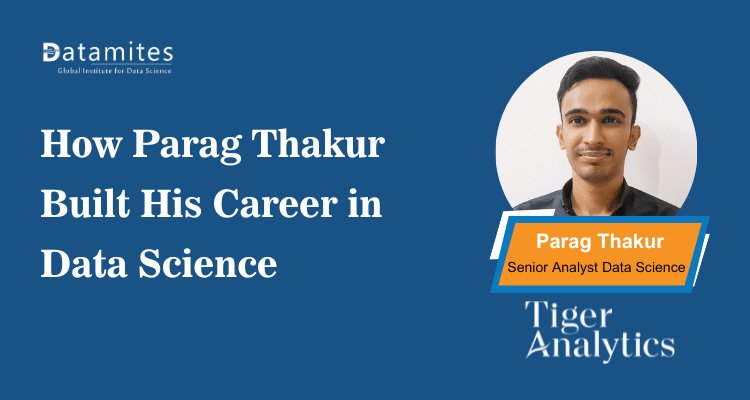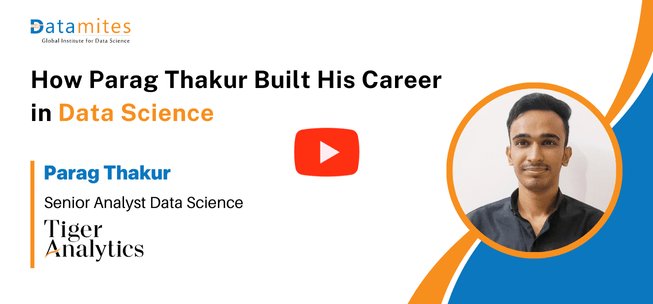How Parag Thakur Built His Career in Data Science
Parag Thakur went from no programming background to a Senior Analyst in Data Science by mastering Python, SQL, and ML concepts through structured learning, practice, and networking.

Breaking into data science can seem daunting, given the sheer number of tools, programming languages, and algorithms you need to learn. Parag’s journey proves that with structured learning, dedication, and the right guidance, it’s possible to go from a complete beginner to a professional Machine Learning Engineer. His story highlights how building strong foundations in Python, SQL, and machine learning concepts, combined with practical experience, can make a real difference in achieving career goals.
From tackling his first challenges in coding to landing his dream role, Parag’s path shows the impact of hands-on training and mentorship. For those looking for inspiration, you can watch DataMites success stories to see how structured programs and guidance have helped others like Parag advance in data science and secure their ideal roles.
Parag Thakur’s Journey in Data Science with DataMites Training
Learn how Parag moved from starting out in data science to securing a professional role, developing essential skills, and growing his career through practical training and support from DataMites.
Q1. Can you briefly introduce yourself and your current role?
I’m Parag, and I’m currently working as a Senior Analyst in Data Science at Tiger Analytics. Previously, I worked as a Machine Learning Engineer.
Q2. When did you start your data science journey?
I joined DataMites in August 2020, and that was the official start of my structured learning in data science.
Q3. How did your learning at DataMites help you?
The sessions were online, interactive, and very detailed. Our instructors, Sagar and Ash, taught us concepts from scratch, including machine learning algorithms, formulas, and their applications. It was a complete learning experience from basics to advanced concepts.
Q4. Did you have any programming background before joining DataMites?
No, I didn’t. But Python, which is the core language for data science, was taught very well, so I didn’t face much difficulty. I also learned additional Python skills beyond the syllabus to strengthen my foundation.
Q5. How long did it take to land your first data science job?
It took me a while because of the pandemic, lockdowns, and limited opportunities initially. After completing the course and internship, I worked as a business consultant for about 7–8 months while continuing to look for data-related roles. Eventually, in December 2021, I got my first opportunity as a Machine Learning Engineer at AlMox.
Q6. How did DataMites support you during the job placement process?
The placement team, especially Pana, played a crucial role. They coordinated job opportunities, shared openings, and guided me through the entire application and interview process.
Q7. What was your study pattern while preparing for interviews?
I first ensured that I thoroughly understood Python and all basic data science concepts. I focused on machine learning algorithms like regression, classification, and time series forecasting. I created cheat sheets for algorithms, validation techniques, and packages to revise before interviews.
Q8. How important is Python knowledge for interviews?
It’s critical. Most interviews require practical coding. For instance, I was asked to implement Fibonacci series, prime numbers, and other algorithms live during interviews. Python is not just about syntax; you need to know how to use it for problem-solving effectively.
Q9. Did you face challenges while learning SQL and machine learning concepts?
Yes, some interviews required writing SQL queries and implementing machine learning models. I made sure to practice both thoroughly. Knowing how to merge tables, validate models, and choose the right algorithms was crucial.
Q10. How did you handle assignments given during interviews?
Assignments are meant to test your understanding. Even if you take reference from someone else, you must know exactly what was done and why. Interviewers will dig deep into your approach, and you should be able to explain every decision with data.
Q11. How many interviews did you give before getting selected?
It varies. For my first job, I had one or two rounds in different companies. For Tiger Analytics, the process took around eight months because I wanted a role in a reputed company in the right city.
Q12. What advice do you have for connecting with companies?
Don’t rely solely on quick applications on LinkedIn. Instead, network directly with employees in the company and try to get referrals. This significantly increases your chances since referrals are valued in hiring processes.
Q13. Were any real datasets given in your interviews?
No, mostly assessments tested Python, SQL, and machine learning knowledge. Some interviews, like IBM, combined SQL and Python coding challenges. Insights and visualization tasks were not asked in my experience.
Q14. How did you decide which machine learning algorithm to use?
It depends on the problem. For regression tasks, I learned to choose between linear regression, random forest, or XGBoost based on overfitting or underfitting. Understanding the problem context and having the flexibility to try alternatives is important.
Q15. How useful are internships for learning?
Internships are more about applying knowledge than just gaining experience. They teach you how to implement solutions, handle projects, and think critically. Even if interviewers focus on projects, internship experience is invaluable for your personal learning curve.
Q16. What’s the best way to handle project discussions in interviews?
Know your project inside out. Understand the standard approaches and identify ways your approach improves on them. This shows problem-solving ability and initiative, which companies value highly.
Q17. How should one prepare for live coding interviews?
Parag advises mastering Python thoroughly. During interviews, you may be asked to code on the spot within 3–4 minutes. You must know functions, classes, series, prime numbers, and other common problem types confidently.
Q18. What final advice would you give aspiring data scientists?
Be thorough with Python, SQL, and machine learning concepts. Practice coding challenges, understand assignments fully, and focus on connecting with the right people in companies. Patience is key landing a role in a top company takes time, but consistent effort pays off.
Refer to these articles:
- Vinay Gaikwad’s Journey in Freelance Data Science
- Freelancing in Data Science: Samapika Singh’s Insights
- Saurav’s Journey: From Fresher to Data Scientist
Key Lessons from Parag Thakur’s Data Science Career Journey
Here are the main takeaways from Parag Thakur’s journey that can guide anyone looking to start or grow a career in data science.
- Parag began structured learning in data science in August 2020 at DataMites.
- He had no prior programming experience before joining the course.
- DataMites provided interactive, detailed sessions covering Python, machine learning algorithms, formulas, and applications from basics to advanced concepts.
- Mastery of Python is critical for interviews, including problem-solving with algorithms like Fibonacci and prime numbers.
- Proficiency in SQL and implementing machine learning models is essential for tasks like data merging, model validation, and algorithm selection.
- Internships are valuable for applying knowledge, handling projects, and improving problem-solving skills.
- Parag worked as a business consultant for 7–8 months after his course before landing his first Machine Learning Engineer role in December 2021.
- DataMites’ placement team guided him through job applications, interviews, and opportunities, emphasizing networking and referrals.
- He focused on Python, core data science concepts, and machine learning algorithms, using cheat sheets to revise key topics.
- Candidates must fully understand any assignments or projects they reference, including methodology and reasoning.
- Choosing a machine learning algorithm depends on the problem context, with flexibility to try alternatives.
- Direct networking with company employees and referrals increases chances of landing interviews more than relying solely on job portals.
- Practicing coding problems under time constraints is crucial; interviews test Python fundamentals, functions, classes, and common algorithmic problems.
- Landing a role at a reputed company can take time, but consistent effort, patience, and thorough preparation eventually lead to success.
- Build strong foundations in Python, SQL, and machine learning, practice coding challenges, understand assignments/projects deeply, and connect strategically with the right people.
Refer to these articles:
- Why Data Scientist Career in Hyderabad
- Data Science Course Fee in Hyderabad
- Data Science Course Fees in Coimbatore
- Why Data Scientist Career in Coimbatore
Parag Thakur’s journey proves that breaking into data science is about strategy, persistence, and strong foundations. From zero programming experience to a Senior Analyst role, he shows the power of structured learning, hands-on practice, and smart networking. Master Python and SQL, understand algorithms, tackle projects confidently, and connect with the right people consistent effort and patience can turn your data science ambitions into reality.
If you’re starting out in data science or considering a career switch, Parag’s journey highlights the importance of building strong fundamentals, practicing regularly, and gaining practical experience. According to Grand View Research, the global data science platform market, valued at USD 96.25 billion in 2023, is projected to grow at a 26% CAGR from 2024 to 2030, driven by the massive increase in data generated through digital activities. With industries producing enormous amounts of data, the demand for skilled professionals is rising rapidly, making data science one of the IT courses in demand today.
Parag’s career growth was supported by structured training at DataMites institute. With beginner-friendly courses designed for learners from non-technical backgrounds, he mastered Python, statistics, and machine learning, while gaining hands-on experience through internships as a Data Analyst and then through data science projects. Accredited with globally recognized certifications like IABAC and NASSCOM FutureSkills, DataMites equips learners with project experience, expert mentorship, and placement support. Choosing a data science course in Hyderabad, Bangalore, Kolkata, Pune, Mumbai, Chennai, or Delhi can open doors to a rewarding, future-ready career.
Whether you’re a fresher, a professional from a non-technical field like Parag, or exploring a career transition, DataMites makes high-quality data science education accessible. With both online and offline centers, including data science courses in Coimbatore, Pune, Mumbai, Bangalore, Chennai, Ahmedabad, and Hyderabad, along with flexible online options, Parag’s story proves that with structured guidance, practical learning, and consistent effort, moving into data science is entirely achievable and a smart move for a future-ready career.

